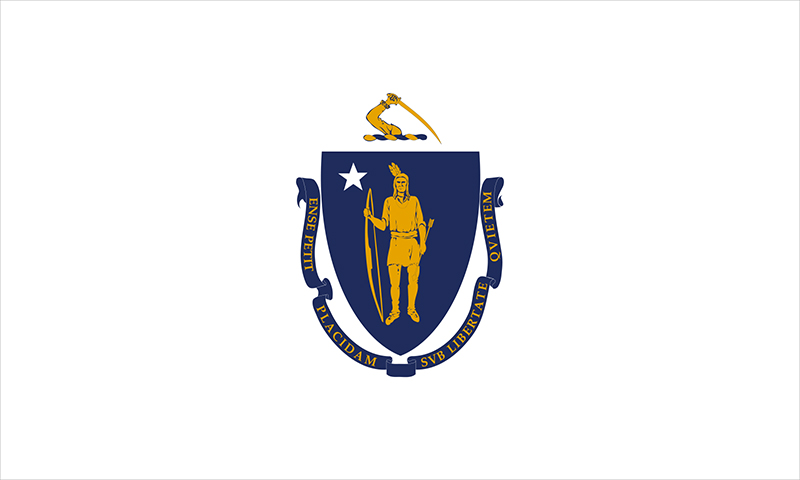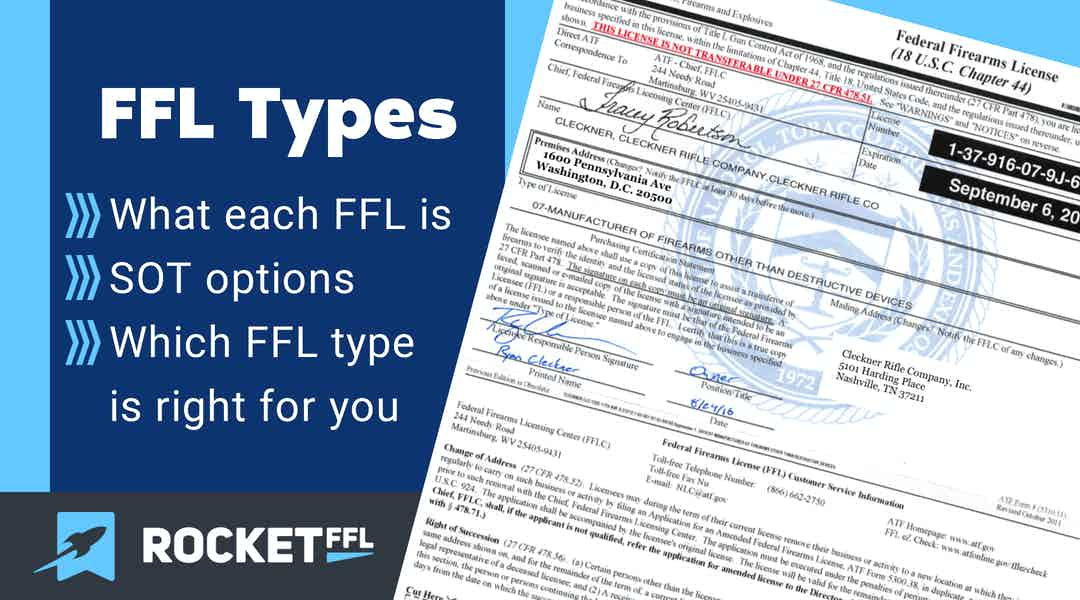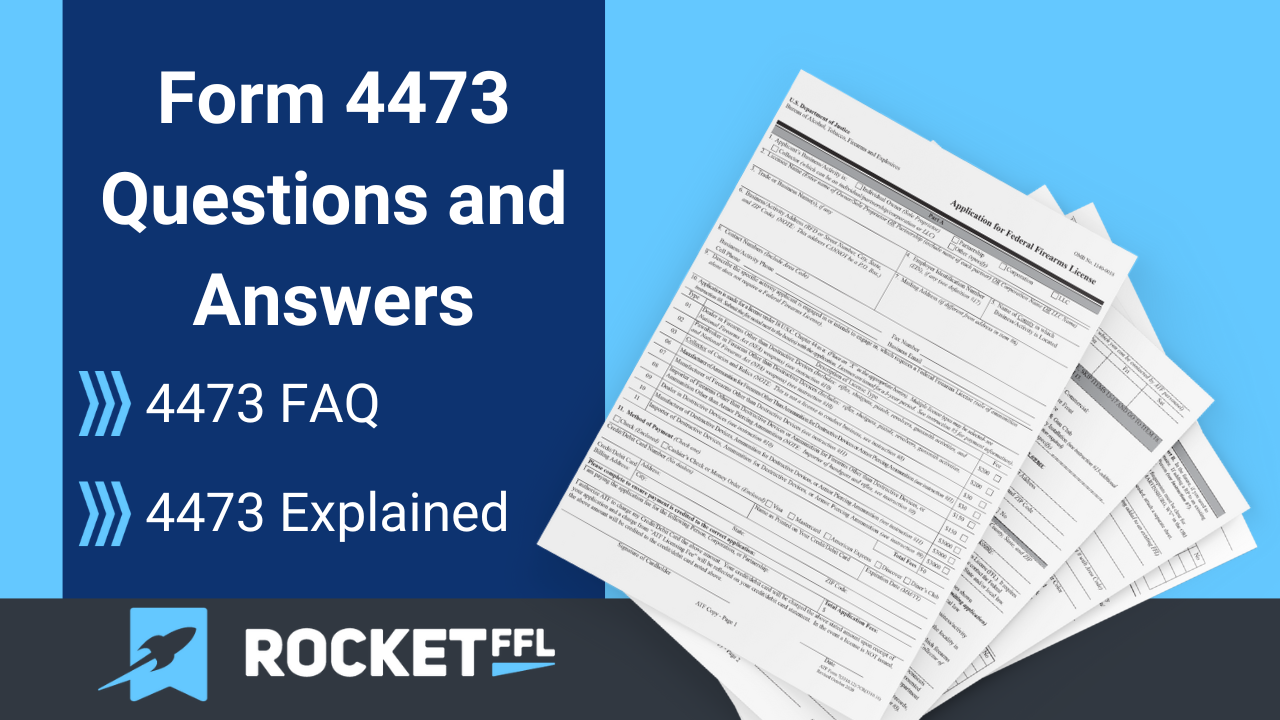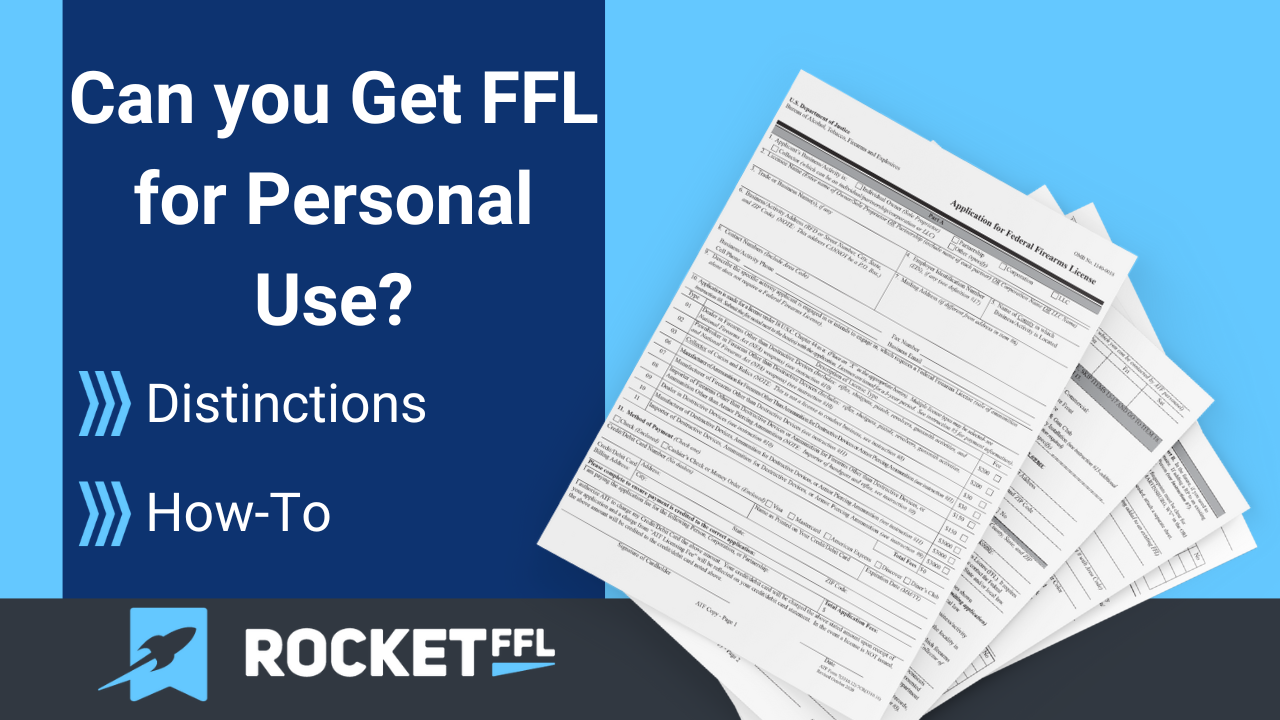There a different types of FFL to choose from. Make sure you understand which FFL type is best for you.

Get Your FFL in Massachusetts (MA) [For Firearms Dealers]
Many gun owners look for ways to share their passion with other people around them. This may take the form of taking their friends shooting, teaching people about firearm safety, or simply talking about it in conversations.
But for many, the epitome of this passion is opening up their very own gun store.
To do this, you must apply for a Federal Firearms License (FFL). An FFL allows you to legally sell guns such as handguns, long guns, ammo, and other NFA items. This would also allow you to sell at special events, such as gun shows.
As great as this may sound, several requirements must first be met on both a Federal and State level. Here at Rocket FFL, we are determined to help you meet these requirements with all the proper knowledge to make the process as easy as possible!
In this article, we will discuss:
- FFL Cost
- Steps to getting your FFL in Massachusetts
- Federal Requirements for an FFL
- Massachusetts State Requirements for an FFL
- Massachusetts Local (City/Town) FFL Requirements
- FAQs and additional resources
FFL Cost in Massachusetts
How much does an FFL cost? An FFL in Massachusetts costs between $30-$200 for the first 3 years. This applies to all states.
When you fill out an FFL application with the Bureau of Alcohol, Tobacco, Firearms, and Explosives (ATF), you choose from several license types.
Each of these license types varies in price due to the different functions they allow the licensee to perform. This includes whether the license holder is just trying to sell a few handguns, start gunsmithing, collect rare firearms and curios, or sell NFA items (like suppressors, short-barrel rifles, machine guns, etc.), for example.
Each of these activities requires a different type of license for which the application fees range in price.
FFL License Cost by Type
| FFL License | Application | Renewal | Years |
|---|---|---|---|
| Type 01 | $200 | $90 | 3 |
| Type 02 | $200 | $90 | 3 |
| Type 03 | $30 | $30 | 3 |
| Type 06 | $30 | $30 | 3 |
| Type 07 | $150 | $150 | 3 |
| Type 08 | $150 | $150 | 3 |
| Type 09 | $3,000 | $3,000 | 3 |
| Type 10 | $3,000 | $3,000 | 3 |
| Type 11 | $3,000 | $3,000 | 3 |
To handle NFA items (such as silencers, short-barrel rifles, machine guns, destructive devices, etc.), you must pay additional costs in the form of an SOT license registration.
Steps to Getting Your FFL
To get your FFL in Massachusetts, you need to:
- Ensure you meet the federal and state requirements for an FFL
- Choose your FFL type
- Take an FFL course
- Submit your FFL application forms
Step 1: Ensure You Meet FFL Federal and State Requirements
The first thing you will need to do is make sure that you comply with all Federal and State laws.
The federal requirements are the same for every state and are explained in detail below. We also walk you through the basic MA state requirements.
Step 2: Choose Your FFL Type
Second, make sure you apply for the appropriate type of FFL. Depending on what you are trying to do with your business, choose the license type that allows you to lawfully operate your firearms business.
More often than not, you will probably need either a Type 01 license (for most firearms dealers and gunsmiths) or a Type 07 license (for manufacturing). Type 07 license holders may both manufacture and sell firearms.
To determine what type of FFL best suits your needs, read this article, where we break it down.
Some types of firearms and accessories require you to be an SOT (Special Occupational Taxpayer). You’ll apply as an SOT after being assigned your FFL number. These requirements are from the National Firearms Act of 1934 (NFA), later updated with Title II of the Gun Control Act.
You’ll need to be an SOT if you plan to sell these NFA items:
- Silencers
- Full-auto machine guns
- Short-barreled rifles (rifles with a barrel shorter than 16″ or an overall length under 26″)
- Short-barreled shotguns (shotguns with a barrel shorter than 18″ or an overall length under 26″)
- Destructive devices (grenades, mines, bombs, etc.)
- Any other weapons (pen guns, specific special handguns, etc.)
The table below describes each FFL License type and which SOT Class you’ll need to apply for after getting your FFL to sell firearms covered under the NFA.
We cover all of the specifics of SOT classes and the NFA in our Get Your FFL Course.
FFL License Types
| FFL License Type | FFL License Purpose | SOT Class |
|---|---|---|
| Type 01 FFL | Dealer/Gunsmith of Firearms | 3 |
| Type 02 FFL | Pawnbroker/Dealer of Firearms | 3 |
| Type 03 FFL | Collector of Firearms | n/a |
| Type 06 FFL | Manufacturer of Ammunition | n/a |
| Type 07 FFL | Manufacturer/Dealer of Firearms and Ammunition | 2 |
| Type 08 FFL | Importer/Dealer of Firearms | 1 |
| Type 09 FFL | Dealer of Destructive Devices | 3 |
| Type 10 FFL | Manufacturer/Dealer of Destructive Devices | 2 |
| Type 11 FFL | Importer/Dealer of Destructive Devices | 1 |
Step 3: Take an FFL Course
Next, take an FFL course from a qualified instructor.
FFL license logistics can be complex. I developed this course based on decades of research and work as an attorney in the firearms industry to help you get your FFL hassle-free.
It covers the federal-level information you need to apply for your FFL and everything you need to know to get your FFL in Massachusetts.
I highly recommend that you get the FFL Course and SOT Course combo. For an extra $10, learn how to apply to buy and sell silencers and Short Barreled Rifles (SBRs) in addition to standard firearms covered by just your FFL. Select the course add-on at checkout for both courses.
Step 4: Submit Your FFL Application Forms
Finally, once you’ve made sure you meet all requirements (federal and state), verified the appropriate FFL type for your business, and taken the Rocket FFL course, you can “pull the trigger” and apply for your FFL!
The ATF begins by completing a background check through the NICS system on all “responsible persons” (RP) for the business. This includes the sole proprietor, partners in the corporation, or anyone who will influence its practices and policies.
Once all application paperwork is verified and all background checks are complete, the application is sent to a local ATF field office. From there, an industry operations investigator (IOI) will set up an in-person interview with you to make sure all information is still correct and that you are following all state and local requirements.
After the interview, the IOI will recommend approval or denial of your FFL application. Assuming you passed, the ATF field office supervisor submits the approved application to the Federal Firearms Licensing Center (FFLC).
You’ll be the newest FFL holder in Massachusetts!
The ATF estimates that the entire process only takes about 60 days from when a completed application is received. Depending on your state, the ATF may require multiple forms and extra steps.
However, if you took the Rocket FFL course, you’ll have every detail and access to all the necessary forms to quickly apply for your Federal Firearms License.
Federal Requirements for an FFL
The federal requirements for getting an FFL are the same for every state.
Federal requirements to get your FFL include that you:
- Are at least 21
- Are a US Citizen or legal permanent resident of the US
- May legally possess firearms and ammunition (no felony convictions, have not been a psychological patient or controlled substance user, etc.)
- Have a predetermined location for conducting FFL activities (in MA, this may not be a home residence)
- Have never violated the Gun Control Act (GCA) or related regulations
- Do not make any false statements/claims on your FFL application
With all of the federal requirements met, you can now turn your attention to the state requirements.
Massachusetts State Requirements for an FFL
Massachusetts state requirements for an FFL can be broken down into two categories:
- State licensing requirements
- Business registration requirements
Massachusetts State Licensing Requirements
In addition to your FFL, Massachusetts also requires you to obtain a state Firearms Dealers License. The completed application must be submitted to your local law enforcement agency (police department).
As a part of this process, you’ll provide two references and a reason for requesting a license. This information will be included in the actual application and submitted at one time.
Massachusetts state law also requires that all transactions be recorded through the Massachusetts Instant Record Check System (MIRCS).
All of this information and more can be found on the Mass.gov website.
Massachusetts Business Registration Requirements
Regardless of the type of business you plan on starting, you must register it and receive a state license to lawfully operate. This goes for any state you may be located in.
Even if your business is registered in another state (which we suggest in our Get Your FFL course), you’ll still need an official presence in Massachusetts.
To make sure you don’t miss any step in the process, check out this helpful page from the Massachusetts government to start a new business.
Massachusetts Local (City/Town) FFL Requirements
Local zoning requirements are usually one of the biggest problems when applying for an FFL. Most importantly, you must ensure the location you use as a base of operations allows for a firearms business.
In Massachusetts, this strictly excludes home operations. It is required by state law that all firearms businesses operate in a brick-and-mortar location of some kind, not in a residential area. The only slight exception to this is a Type 03 FFL (a Curios and Relic License).
We cover this and more, including requirements for specific business hours, in our Get Your FFL course.
Massachusetts FFL Summary
Although Massachusetts may not be the most effortless state to operate a gun store. But we believe that with a little bit of guidance and the correct information, you can be the newest gun dealer in your community!
As long as you meet the Federal and State requirements, choose the appropriate license type, take our online course, and fill in the proper forms, you’ll be on your way to being the newest owner of a Massachusetts FFL.
Don’t try to get it right on your own. Take our course to give yourself the peace of mind that you’re operating within the law of your local licensing authority.
With our course, you can confidently submit all the required documentation, references, and information you need to become a legally operating FFL dealer.
So, if you’re ready, let’s get started!
FAQ for Massachusetts FFL Licensing
How much does it cost to get an FFL in Massachusetts?
An FFL in Massachusetts costs anywhere from $30 to $200 for 3 years. For a full breakdown of the cost of an FFL, check here.
Do I need an FFL in Massachusetts?
Yes! If you plan to sell, transfer, manufacture, or do anything else for profit involving firearms, you are legally required to have an active FFL.
Does Massachusetts require extra licensing for FFLs?
Yes, the state of Massachusetts requires you to get a Firearms Dealers License and record all transactions through the Massachusetts Instant Record Check System (MIRCS).
Do I need to register a business for an FFL in Massachusetts?
Yes, if you are forming a business for your FFL, it must be registered in Massachusetts.
Can I get an FFL to save money on guns?
No, you should not get an FFL just to save money on guns. One of the main requirements for getting your FFL is “business intent,” meaning you intend to operate a firearms-related business.
However, you may wait to start your business until after you get your FFL number.
Extra Resources For Getting a Massachusetts FFL
US Code § 923: Code § 923 covers federal regulations for the import, manufacture, and dealing of firearms and ammunition. This is the federal law that requires those operating firearms businesses to get an FFL.
US CFR § 478.47 – Issuance of license.: This code explains how a Federal Firearms License is issued, including who must assign the license number. It requires the ATF (Bureau of Alcohol, Tobacco, Firearms and Explosives) to qualify applicants based on a predetermined list of requirements and to issue Federal Firearms Licenses.
If a correctly submitted FFL application has been submitted on ATF Form 7, the Chief of the Federal Firearms Licensing Center (a department at the ATF) must issue the license and assign a serial number to the licensee.
Gun Control Act (GCA): The GCA of 1968 establishes stricter laws on the firearms industry than were already present in the NFA. New regulations regarding firearms offenses, firearms/ammunition sales to “prohibited persons,” and federal jurisdiction for “destructive devices” (bombs, grenades, mines, etc.) were created with the GCA.
Starting a Business in Massachusetts: Need help finding out where to start with your new business? Check out this webpage from the Massachusetts government that provides information on every step of the process; from forming your business plan to registration!
Massachusetts Firearms Dealer License Application: This is a copy of the application from the Massachusetts Office of Public Safety and Security that you will need to fill out. You will also list your two references on this application.
Massachusetts Information for Firearms Dealers: This website from the state government provides all the information you will need on licensure and licensure renewals for FFL businesses.
FFL Types: Use this guide to make sure that you choose the right type of Federal Firearms License for what you want to do.
Home-Based FFL: Don’t want to pay for a storefront but wish to operate as an FFL holder from your home? We explain how to do it from start to finish.
Recommended Posts



